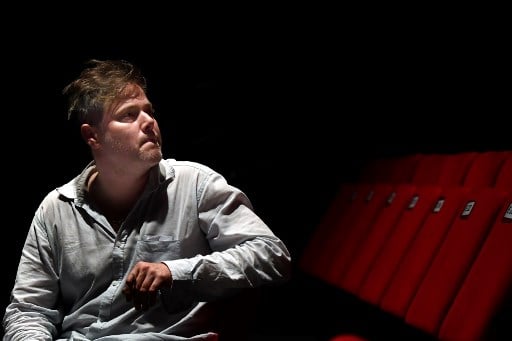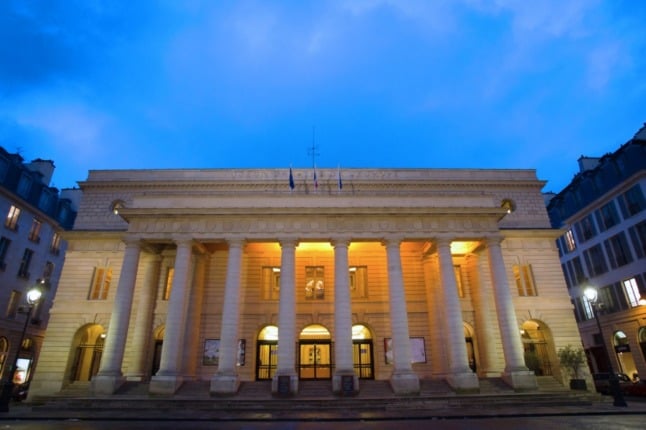Now director Milo Rau, who tried to recruit returning Islamic State jihadists for an upcoming show in September, is rewriting the rules of theatre itself.
With his latest play about the sadistic murder of a gay man in Belgium opening to ecstatic reviews at the Avignon festival in France, the former sociologist has declared that theatre is not just about showing the world, “it's about changing it”.
Swiss-born Rau is as acclaimed as he is controversial.
His carefully-researched take on the Rwandan genocide, “Hate Radio”, was widely hailed as a masterpiece. British newspaper The Guardian called “The Congo Tribunal” — where Rau and his team travelled to the strife-torn eastern DRC to interview soldiers and civilians — “one of the most ambitious pieces of political theatre ever staged”.
Nor has he been afraid to put his own neck on the line.
Cossacks surrounded a Moscow performance of his recreation of the Pussy Riot trial, with immigration officers interrupting the show to question him.
After being handed the keys to the NTGent theatre in the Belgian city of Ghent this year, Rau set out his own 10 commandments for making theatre.
His “Ghent Manifesto” — an echo of the Dogme 95 rules for filmmakers laid out by Danish tyros Lars von Trier and Thomas Vinterberg — decrees among other things that a minimum of two non-actors be used in every play and that at least one show per season must be rehearsed or performed in a war zone.
Fearless
“Literal adaptations of classics are forbidden,” it adds, and the set of all shows — which must tour — should fit into the back of a van.
But above all the 41-year-old insists that theatre should be as “real” as possible.
A student of the French sociologist Pierre Bourdieu, Rau took his teachings to heart. “Bourdieu told me that if you want to talk about boxing you must become a boxer.
“I do the work of a journalist and a sociologist when I recreate something in a theatre,” he told AFP of his latest work at Avignon, “La reprise” (“Recovery”).

Tom Adjibi performs in the play “La Reprise” . Photo: AFP
Rau talked to the family and friends of Ihsane Jarfi, a 32-year-old gay man who was beaten to a pulp in Liege in 2012, before taking on the homophobic murder that horrified Belgium and its aftermath.
“My starting point was how to represent something as horrible as this on stage,” he said.
And as you would expect from a director whose work is banned in several countries, Rau's approach was typically fearless — with one scene in which one of the killers urinates on the dying man carrying a warning from the festival's organisers.
But critics, including France's Le Figaro, praised Rau's “exceptionally powerful” staging and his ability to somehow bring a sense of restraint and decency to “almost unwatchable scenes of violence”.

Rau poses for photographs on a set created for his play “Compassion, history of the machine gun”. Photo: AFP
'Art must be provocative'
The director, whose company is called the International Institute for Political Murder, told AFP that he was not cowed by controversy.
In a world wracked by war and injustice, “reality is the real provocation, so art has to be too if it wants to be real and engaged,” he added.
“My work is more complex than simply going for provocation.
“I don't say to myself, 'No, that's too direct, I won't do that'. I look for the gesture that is going to bring a real theatrical and emotional truth,” Rau insisted.
And his only limits “are the legal ones”.
For his next project, “Mystic Lamb” — inspired by the altarpiece by the Van Eyck brothers at Saint Bavo's Cathedral in Ghent for which he wanted to cast returning jihadists — Rau even toyed with slaughtering a lamb on stage.
“It's a metaphor for Jesus, but you can't do that, of course. They would have closed the theatre,” he said.
But that does not stop Rau taking his knife to sacred cows, or texts.
“Everyone is always saying how Moliere has so much to tell us. But that's not true, we need new plays and new Molieres,” he said.
“For me, the creative process demands a tabula rasa, a clean sheet, not 500-year-old texts which we try to bring up to date by doing Moliere dressed as jihadists.”



 Please whitelist us to continue reading.
Please whitelist us to continue reading.